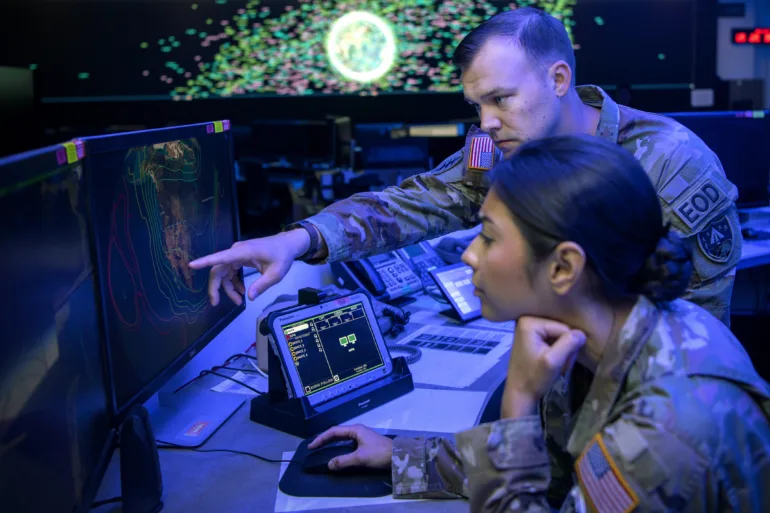TL;DR:
- The Space Force must be a “digital force” to meet future mission demands, and Space Operations Command is seeking ways to integrate AI and machine learning.
- Brig. Gen. Kyle Paul is driving the integration of AI/ML into Space Force operations.
- The integration of AI/ML is crucial to improve operations and increase efficiency across Space Force mission areas.
- Space Force personnel must have the ability to unify their capabilities and field a “combat-credible” force for future missions.
- The Space Force must move away from a siloed approach and operate as a unified force, like a Navy carrier strike group.
- Delta 15, a new unit at Schriever Space Force Base, will provide space battle management and will serve as the core component of the National Space Defense Center.
- The Space Force must work across stovepipes and bring together intelligence, defense, cyber, and joint fires to ensure the Joint Force access to essential space capabilities and defend its assets.
Main AI News:
In a landmark speech at the Space Foundation’s Space Symposium, Lt. Gen. Stephen Whiting, the Commander of Space Operations Command, declared that the Space Force must be a “digital force” in order to meet the demands of future missions. The Space Operations Command is actively seeking ways to integrate artificial intelligence and machine learning into its operations, as the limited size of the Space Force necessitates robust digital capabilities to support the Joint Force and its citizens.
Brig. Gen. Kyle Paul of the Royal Canadian Air Force, serving as the Deputy Command General for Transformation at Space Operations Command, has been instrumental in driving the integration of AI/ML into Space Force operations. According to Gen. Whiting, the integration of these cutting-edge technologies is crucial at a time when practical applications of AI/ML are widely available, offering the potential to improve operations and increase efficiency across the Space Force mission areas and enterprise.
As guardians of the space domain, Space Force personnel do not physically conduct missions like their counterparts in other services. However, they must have the ability to unify their capabilities and field a “combat-credible” force for future missions. Leveraging digital tools such as AI and machine learning is essential to achieving this goal, said Gen. Whiting.
As the Space Force takes on a growing range of responsibilities, including satellite communications, precision navigation and timing, and space domain awareness, it must move away from a siloed approach and operate as a unified force, according to Lt. Gen. Stephen Whiting, Commander of Space Operations Command. He compared the Space Force to a Navy carrier strike group, which brings together aircraft, ships, submarines, and joint support elements to conduct offensive and defensive missions, intelligence, and command and control, among other things.
In March, the Space Operations Command activated Delta 15, a new unit at Schriever Space Force Base in Colorado, which will provide space battle management capabilities, mission-ready crew forces, operational training, and simulation. Delta 15 will serve as the core component of the National Space Defense Center in partnership with the U.S. Space Command. According to Gen. Whiting, this is a “very important evolution” as the center was originally established as a joint organization and is now becoming a service command-and-control element.
As the Space Force continues to evolve, it must work across traditional stovepipes and bring together intelligence, defense, cyber, and joint fires to ensure that Joint Force members have access to essential space capabilities at all levels of conflict while also defending its assets, said Gen. Whiting.
Conlcusion:
The adoption of artificial intelligence and machine learning by the Space Operations Command and the Space Force demonstrates a commitment to improving operations and increasing efficiency in the face of increasing responsibilities in the space domain. The integration of these cutting-edge technologies will play a critical role in enabling the Space Force to operate as a unified and combat-credible force for future missions.
The activation of Delta 15, a new unit at Schriever Space Force Base, is a significant step forward in this evolution and will provide essential space battle management capabilities and support the National Space Defense Center. This development is likely to have significant implications for the market and could drive increased investment in AI and machine learning technologies in the defense and aerospace sectors.

